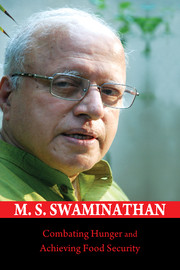Book contents
- Frontmatter
- Contents
- Foreword
- Preface
- Acknowledgements
- Abbreviations
- 1 Genesis and Growth of the Yield Revolution in Wheat
- 2 Our Agricultural Heritage
- 3 Shaping Our Agricultural Destiny
- 4 Thrust on Farm Revival
- 5 Nutri-farm Movement
- 6 Nutrition-sensitive Agriculture
- 7 Food Losses and Food Waste
- 8 Rice in Zero Hunger Challenge
- 9 Monsoon Management
- 10 Importance of Ecological Conservation
- 11 Caring for Ecology and Heritage
- 12 Conserving Biodiversity
- 13 Overcoming Hidden Hunger through Aquaculture
- 14 Biofuels – The Way to Go
- 15 Food Security
- 16 Vigilance for Sustainable Food Security
- 17 Food Security and Social Protection
- 18 Food Security and its Role
- 19 Sustaining the Livestock Revolution
- 20 Challenges in the Year of Science
- 21 Agriculture and Humanism
- 22 Fostering the Science of Science Communication
- 23 Olympic Move for Saving Children
- 24 Youth: The Agents of Change
- 25 Role of Women in Agricultural Production
- 26 Know-how to Do-how
- 27 From Bengal Famine to Right to Food
- 28 Financial Institutions and Fighting Food Inflation
- 29 Public Good Research in Agriculture
- 30 The Future of Indian Agriculture
- Bibliography
16 - Vigilance for Sustainable Food Security
Published online by Cambridge University Press: 18 December 2015
- Frontmatter
- Contents
- Foreword
- Preface
- Acknowledgements
- Abbreviations
- 1 Genesis and Growth of the Yield Revolution in Wheat
- 2 Our Agricultural Heritage
- 3 Shaping Our Agricultural Destiny
- 4 Thrust on Farm Revival
- 5 Nutri-farm Movement
- 6 Nutrition-sensitive Agriculture
- 7 Food Losses and Food Waste
- 8 Rice in Zero Hunger Challenge
- 9 Monsoon Management
- 10 Importance of Ecological Conservation
- 11 Caring for Ecology and Heritage
- 12 Conserving Biodiversity
- 13 Overcoming Hidden Hunger through Aquaculture
- 14 Biofuels – The Way to Go
- 15 Food Security
- 16 Vigilance for Sustainable Food Security
- 17 Food Security and Social Protection
- 18 Food Security and its Role
- 19 Sustaining the Livestock Revolution
- 20 Challenges in the Year of Science
- 21 Agriculture and Humanism
- 22 Fostering the Science of Science Communication
- 23 Olympic Move for Saving Children
- 24 Youth: The Agents of Change
- 25 Role of Women in Agricultural Production
- 26 Know-how to Do-how
- 27 From Bengal Famine to Right to Food
- 28 Financial Institutions and Fighting Food Inflation
- 29 Public Good Research in Agriculture
- 30 The Future of Indian Agriculture
- Bibliography
Summary
The Chhattisgarh Food Security Act passed in 2012 addresses the three major components of the hunger syndrome, which need to be attended to, for every human being to have an opportunity for a healthy and productive life. These are: first, adequate dietary calories to prevent under-nutrition; second, adequate quantity of proteins to fight protein hunger; and third, eliminating hidden hunger caused by the deficiency of micronutrients like iron, zinc, iodine, vitamin A and vitamin B12.
Thus, the Chhattisgarh Act is designed to solve the hunger problem in a holistic manner. Under this Act, protein hunger is to be eliminated through the supply of pulses, in addition to cereals, and hidden hunger is to be solved through fortified salt. I hope the National Food Security Act, which makes access to the minimum essential calories a legal right, will also help solve concurrently protein-calorie under-nutrition and malnutrition induced by micro-nutrient deficiencies, since an integrated attack on the different components of hunger, as well as the provision of clean drinking water are essential to end the high malnutrition burden prevailing in the country.
The international food stock position and the price volatility prevailing in international markets make it clear that a legal right to food in India can be sustained only with the help of home-grown food. This implies that farmers in India need more attention and assistance. To start with, government should implement the National Policy for Farmers, placed in Parliament in November 2007. The policy proposed by the National Commission on Farmers, which I chaired, calls for a paradigm shift in the measurement of agricultural progress from just production figures to the improvement made in the real income of farmers. In other words, the policy calls for an income orientation to farming. Such a shift is nowhere in sight. If this shift does not happen, it will be difficult to attract youth to farming. The uneconomic nature of farming is accompanied by a steep rise in the price of farmland for use for non-farm purposes. This trend can be arrested only if farming yields good and stable income. A reversal of this trend is not happening, although there is realization that the loss of every hectare of prime farmland will be a blow to the Food Security Act.
The Food Security Act provides the option for substituting grain with cash when necessary.
- Type
- Chapter
- Information
- Combating Hunger and Achieving Food Security , pp. 87 - 90Publisher: Cambridge University PressPrint publication year: 2016



